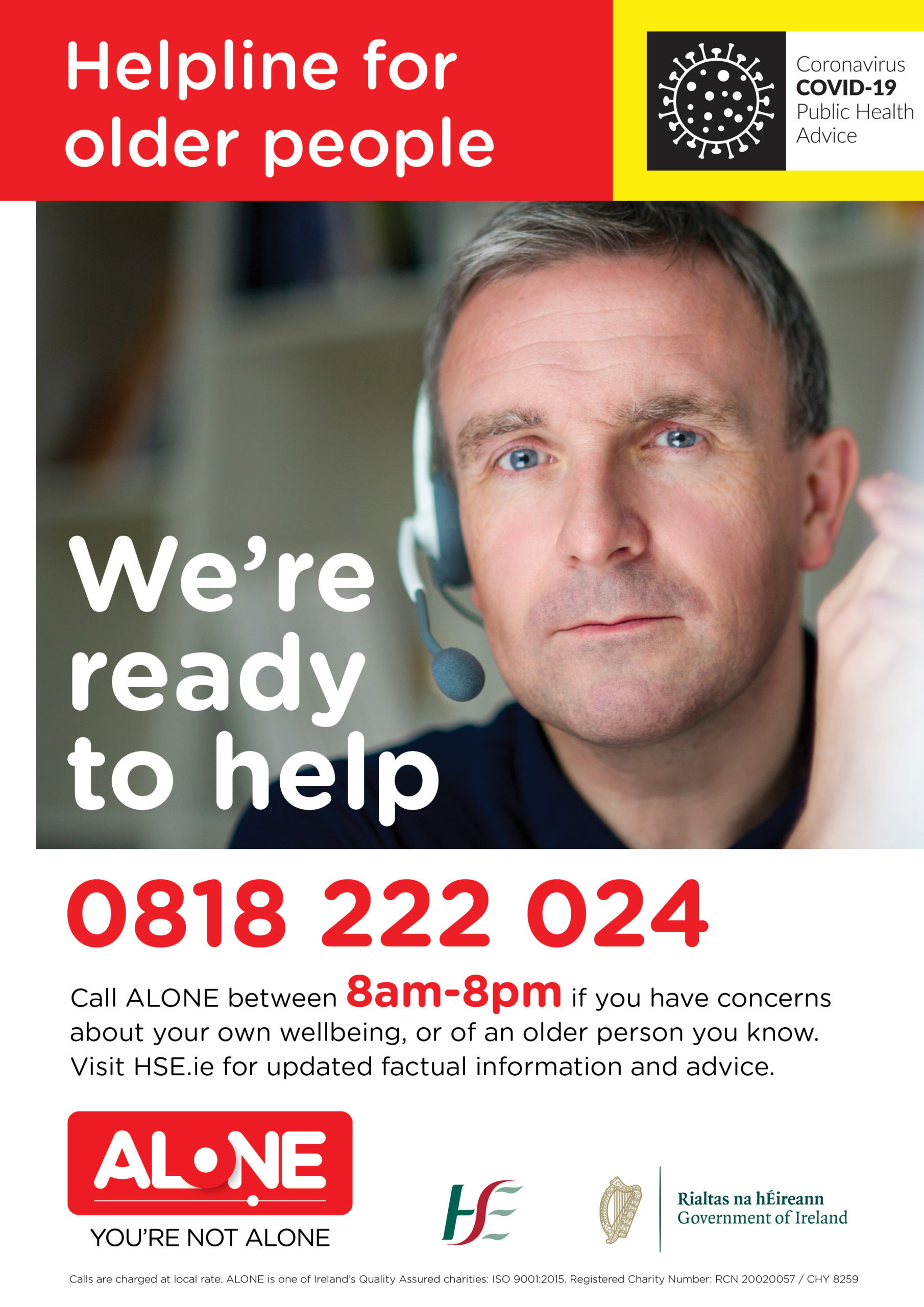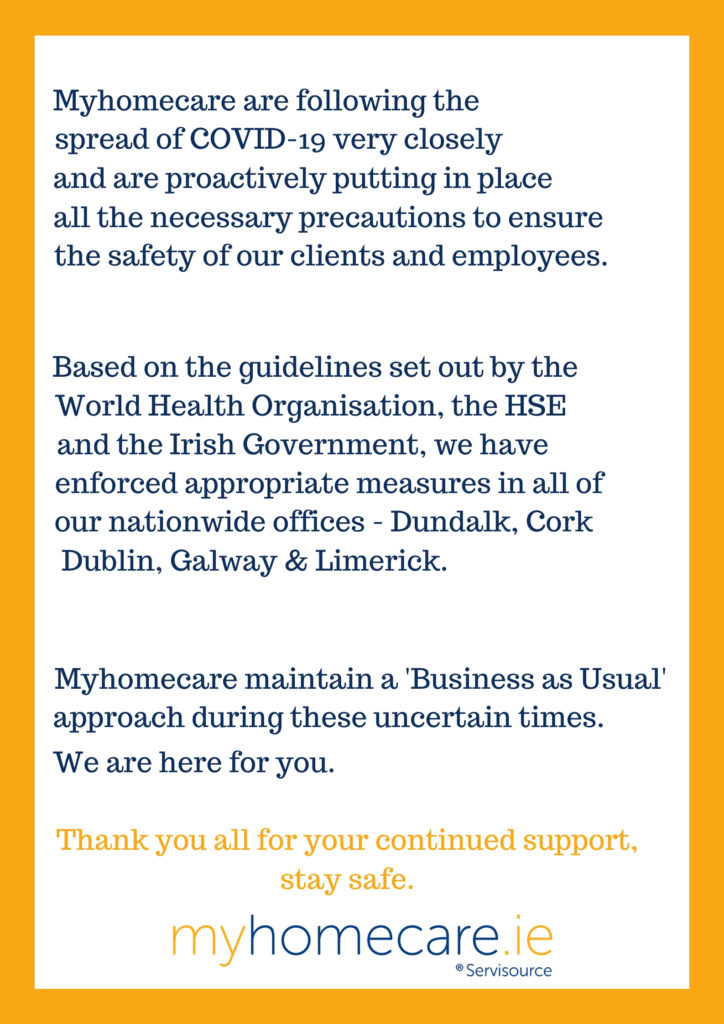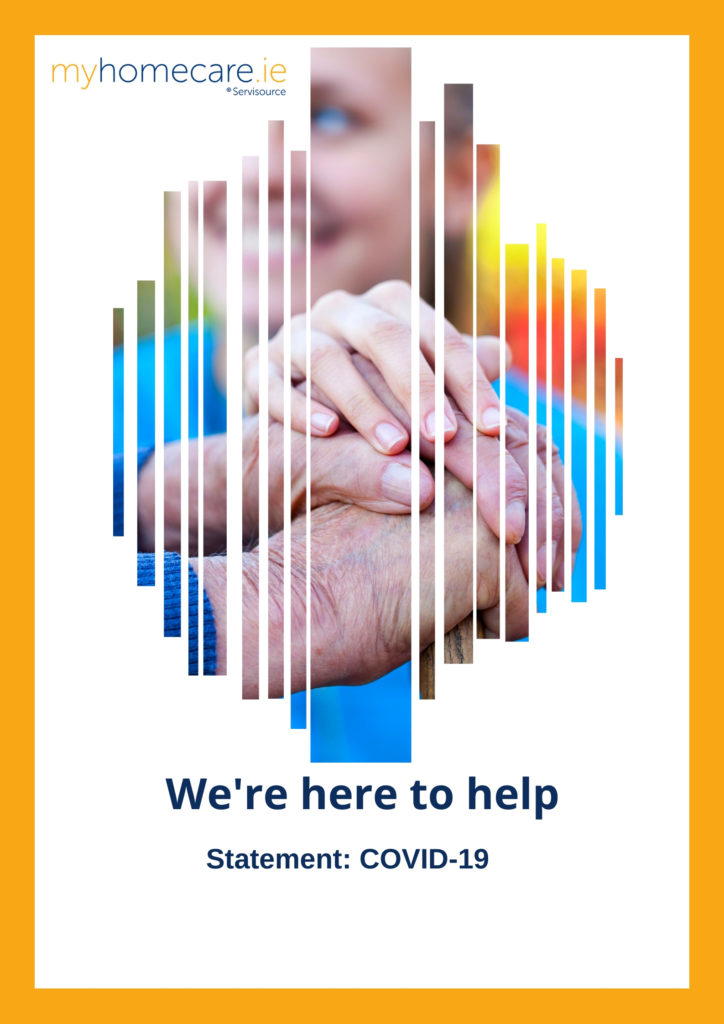National Carers Week 2017 Monday 12th June – Sunday 18th June

National Carers Week 2017 – What is it?
Celebrating its 11th year, National Carers Week takes place this week from Monday 12th – Sunday 18th June. National Carers Week aims to highlight and recognise all the hard-working carers in Ireland. This is a great time to raise awareness of the valuable contribution that carers make to all of our lives. The week is being coordinated by Care Alliance Ireland, in partnership with The Alzheimer Society, The Irish Cancer Society, Family Carers Ireland, The Disability Federation of Ireland, MS Ireland, Acquired Brain Injury Ireland, Inclusion Ireland, St. Michael’s House, The Irish Hospice Foundation and The Special Needs Parents Association.
Myhomecare

To celebrate National Carers Week, we would like to thank and praise our dedicated carers in Myhomecare. At Myhomecare, we have an exceptional team that works with us both internally and externally. They are dedicated, hard working, reliable and willing to go above and beyond to ensure that our care recipients and families receive the best quality of care. Special events are taking place nationwide to celebrate carers. For the full list of events across Ireland, please visit: http://www.carersweek.ie/events#.WT_p12jyuM8.
Being a Carer


We would also like to acknowledge all carers across Ireland for their continuous hard-work. This week should encourage others to support carers who they know and give them the well-deserved break that they deserve. National Carers Week is important as many people throughout Ireland can relate to it. From the carers that have chosen it as a career, to the people that provide care for family members and loved-ones. You could say that caring applies to almost everyone as there are those who have been caregivers, those who currently are caregivers, those who will be caregivers and those who will need caregivers. There are around 360,000 family carers in Ireland at present.

As people are living longer, the call for care is increasing, resulting in the expansion of the care industry. Carers are seeking more respite services and support. What is a carer? Some might say that a carer is an angel without wings. A carer is many things. It is someone who can show empathy, respect, patience and kindness. A carer treats a person the way that they deserve to be treated. Due to their dedication, some carers might experience guilt if they do things for themselves so they end up focusing solely on the patient and neglecting their own needs, resulting in burnout or stress. The exhaustion from this stress can result in the reduction in the quality of care being delivered by the carer. As you cannot pour from an empty vessel, a good carer knows that to be able to care for others, they must also care for themselves.

Stress and the carer
Being a carer can be demanding and being under pressure can lead to stress, especially if you feel you have little control over the situation. People handle pressure and react to stress in different ways so what might be stressful to one carer might not be to another. There are many symptoms of stress and stress can affect the way you think, act and feel. It can also have physical impacts. Here are some signs that you may be stressed.
Symptoms of stress:
- Depression
- Exhaustion
- Anger
- Anxiety
- Constantly worrying
- Insomnia
- High blood pressure
- Low-mood
- Racing thoughts
- Repeatedly going over things
- Constantly on the go
- Change in eating habits
- Temper
- Unsociable
- Drinking/smoking more
- Headaches
- Muscle tension
Coping with your stress

Above are only some signs and symptoms of stress, it is important that if you feel you are experiencing signs of stress that you identify it right away and use techniques that help you DE-stress. If you are experiencing long-term stress that is affecting your health you should visit your local GP immediately. A lot of people are unwilling to ask for help when feeling stressed, but asking for help or talking to someone can help. If your stress is affecting your daily life it is important to talk to someone, whether it be a friend, a family member or a counsellor. Talking to someone else can help to relieve stress and if you ask for advice you could find yourself resolving your problems.
Tips for reducing stress
- Deep-breathing – practice relaxation.
- Listening to music -music can release endorphin’s and happy hormones, reducing stress.
- Reading – distracts the brain form stress.
- Walking – releases endorphin’s and reduces depression.
- Reduce caffeine intake as it can worsen stress.
- Reduce alcohol intake – alcohol is a depressant and can reduce stress in the short-term but in the long-run can cause anxiety, depression and stress.
- Exercising – boosts mood.
- Getting enough sleep – sleep deprivation can have many emotional side affects such as irritability, loss in concentration. It can also have serious health complications such as heart disease and stroke.
- Remain positive – don’t focus on the negative, life is too short.
- Laugh! Life isn’t about waiting for the bad moments to pass, it is about learning how to love and live in them.

Reward yourself
- Care-giving is a job and remember that in a job you are entitled to breaks. Take a rest when rest is due. Tiring yourself out will only make you irritable, affect your health and the quality of your care.
- When people offer you their help – accept it. Help might not come by that often and instead of feeling that you must do everything in your power for your patient, accept that you deserve a break and that people genuinely might want to help.
- Grieve but allow yourself to move on. Losing a patient or a loved-one is never easy. Try not to hold on to the past or to have regrets. Focus on the present and do the best that you can as a caregiver.
- Stand up for your rights as a caregiver. Learn your patients condition inside out and explain this to doctors. Don’t underestimate yourself, know that your efforts to love and make your patient feel comfortable and safe is the most important thing. Go with your gut instinct and fight for what you believe you and your patient are entitled to.
- Embrace your care-giving choice: Sometimes carers can feel resentment from stress or burnout but remember why you have made the choice to provide care and focus on this. It was either that you felt you would be the best provider for your loved-one, that you love looking after people, you want to nurture and care for people and have an impact on the welfare of their life.
- Don’t let care-giving take over your whole life. Get some hobbies, take up something you have always had an interest in. It is important not to lose who you are as a person.

Caregiver Tips

To keep up to date with our content for National Carers Week 2017, visit our Facebook Healthcare Page here: https://www.facebook.com/myhomecare/
















